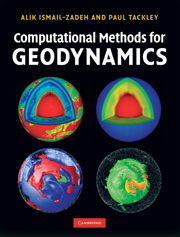Book contents
- Frontmatter
- Contents
- Foreword by Gerald Schubert
- Preface
- Acknowledgements
- 1 Basic concepts of computational geodynamics
- 2 Finite difference method
- 3 Finite volume method
- 4 Finite element method
- 5 Spectral methods
- 6 Numerical methods for solving linear algebraic equations
- 7 Numerical methods for solving ordinary and partial differential equations
- 8 Data assimilation methods
- 9 Parallel computing
- 10 Modelling of geodynamic problems
- Appendix A Definitions and relations from vector and matrix algebra
- Appendix B Spherical coordinates
- Appendix C Freely available geodynamic modelling codes
- References
- Author index
- Subject index
- Plates section
2 - Finite difference method
Published online by Cambridge University Press: 05 June 2012
- Frontmatter
- Contents
- Foreword by Gerald Schubert
- Preface
- Acknowledgements
- 1 Basic concepts of computational geodynamics
- 2 Finite difference method
- 3 Finite volume method
- 4 Finite element method
- 5 Spectral methods
- 6 Numerical methods for solving linear algebraic equations
- 7 Numerical methods for solving ordinary and partial differential equations
- 8 Data assimilation methods
- 9 Parallel computing
- 10 Modelling of geodynamic problems
- Appendix A Definitions and relations from vector and matrix algebra
- Appendix B Spherical coordinates
- Appendix C Freely available geodynamic modelling codes
- References
- Author index
- Subject index
- Plates section
Summary
Introduction: basic concepts
Finite difference (FD) approximations for derivatives were already in use by Euler (1768). The simplest FD procedure for dealing with the problem dx/dt = f (t, x), x(0) = x0 is obtained by replacing (dx/dt)n-1 with the crude approximation (xn- xn-1)/Δt, Δt = tn-tn-1. This leads to the recurrence relation xn = xn-1 +Δtf (tn-1, xn-1) for n > 0. This procedure is known as the Euler method (see Section 7.2 for more detail). Therefore, we see that for one-dimensional (1-D) problems the FD approach has been deeply ingrained in computational algorithms for quite some time. For two-dimensional (2-D) problems the first computational application of FD methods was most probably carried out by Runge (1908). He studied the numerical solution of Poisson's equation Δu =δ2u/δx2 +δ2u/δy2 = c, where c is a constant. A few years later Richardson (1910) published his work on the application of iterative methods to the solution of continuous equilibrium problems by FDs. The celebrated paper by Courant et al. (1928) is often considered as the birth date of the modern theory of numerical methods for partial differential equations.
The goal of the FD method is to reduce the ordinary or partial differential equations to discrete equations approximating the differential equations and making then suitable for computer implementation.
Information
- Type
- Chapter
- Information
- Computational Methods for Geodynamics , pp. 24 - 42Publisher: Cambridge University PressPrint publication year: 2010
Accessibility standard: Unknown
Why this information is here
This section outlines the accessibility features of this content - including support for screen readers, full keyboard navigation and high-contrast display options. This may not be relevant for you.Accessibility Information
- 1
- Cited by
